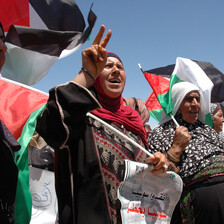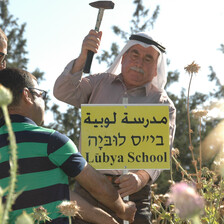The Electronic Intifada Jerusalem 25 March 2015
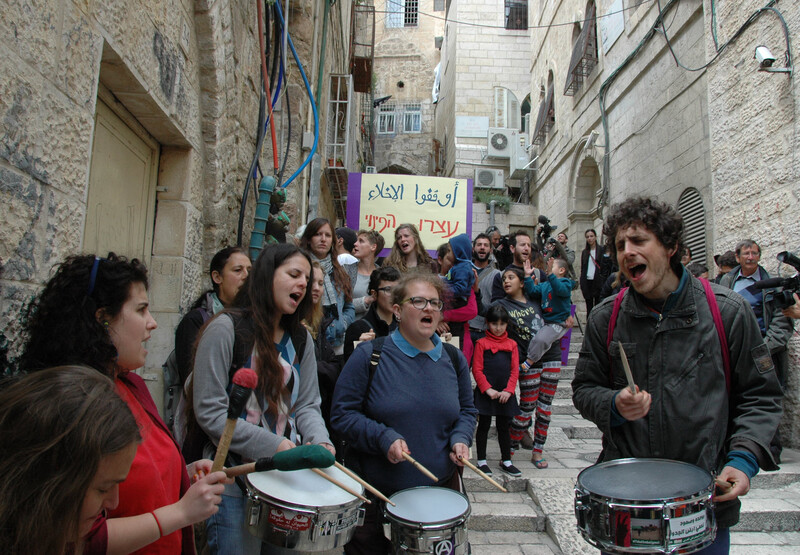
Israeli activists protest in support of the Sub Laban family outside their home on 22 March.
A Palestinian family that has lived in Jerusalem’s Old City since 1953 is being forced out of their home by Israeli settlers backed by the state.
Since 9 February the Sub Laban family of eight have been twice subjected to eviction attempts by Israeli settlers and police. The family are expecting a third attempt to come at any time.
Approximately seventy Palestinian, Israeli and international activists demonstrated outside the family’s home on Sunday in a display of solidarity.
The family believe that were it not for a similar action last week, an Israeli district court would not have issued a temporary injunction which gave them enough time to stop the eviction. However, since then the injunction has expired.
Although the family have an appeal hearing before an Israeli district court to challenge the eviction on 31 May, the court has refused to give an order that would prohibit an eviction before that date. The constant fear of invasion and eviction by Israeli settlers, police — or both — has effectively put the family’s lives on hold.
“Right now if we are inside and we hear anything— if someone comes to the door, or if someone passes by outside — we are afraid that it’s going to be the Israeli forces,” Ahmad Sub Laban told The Electronic Intifada.
“Protected tenants”
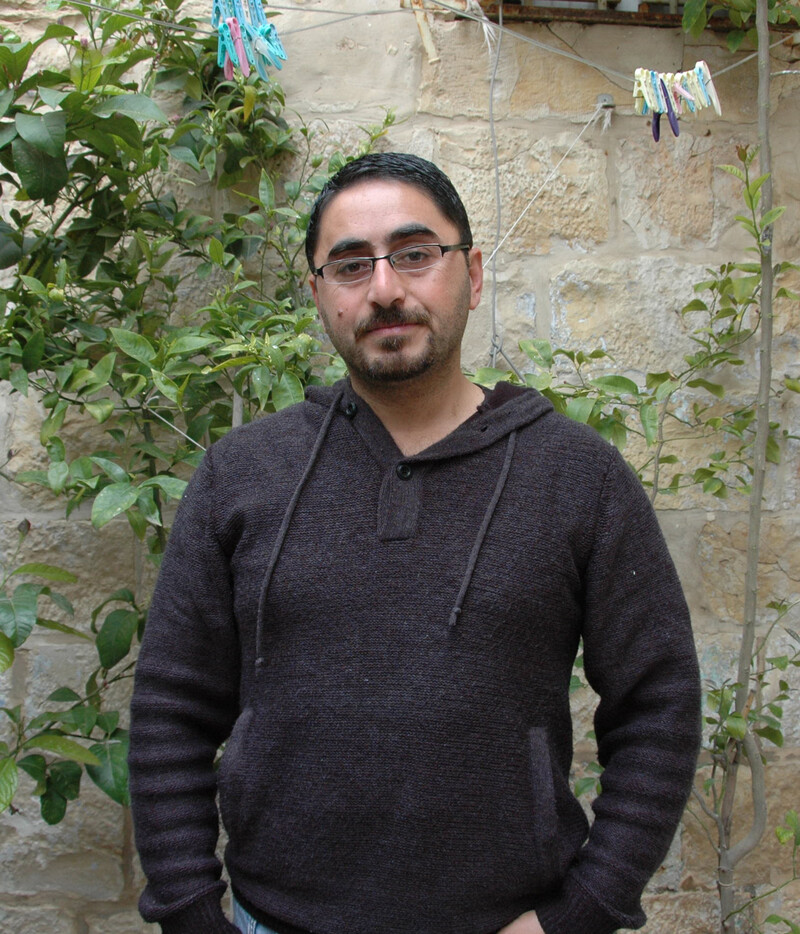
Ahmad Sub Laban in the courtyard of his family’s threatened home.
The Sub Laban home is located in the Muslim quarter of Jerusalem’s Old City, a short distance from the entrance to the Haram al-Sharif compound (which includes the al-Aqsa mosque), as well as the Western Wall and the continually expanding Jewish quarter. The residence’s main entrance off Maalot Khaldiyya Street is shared by two Israeli settler families who also live in the building.
In one part of the family’s home settlers live on the floor above. On sunny days, laundry from the settlers hangs above the Sub Labans’ courtyard. An Israeli flag flies high above from the roof of the shared building.
Rafat Sub Laban, Ahmad’s brother, said that when his maternal grandparents first moved into the house in 1953, they were renting as “protected tenants” from Jordan’s Custodian of Enemy Property (CEP). That body was established to handle property taken from or left by Jews in the West Bank in 1948, the year that the State of Israel was declared on part of historic Palestine.
Today the lease is held by Nora — Rafat and Ahmad’s mother — and allows the family’s tenancy to be protected as long as she and her heirs live in the home. Rafat says that in theory, this should mean that they are immune to eviction or rent increase.
But since Israel occupied East Jerusalem in 1967, the property has fallen under the control of the Israeli Guardian of Absentee Property. Although Ahmad says that the family maintained their protected status through the transfer, the Israeli government has tried various means to push the Sub Labans out.
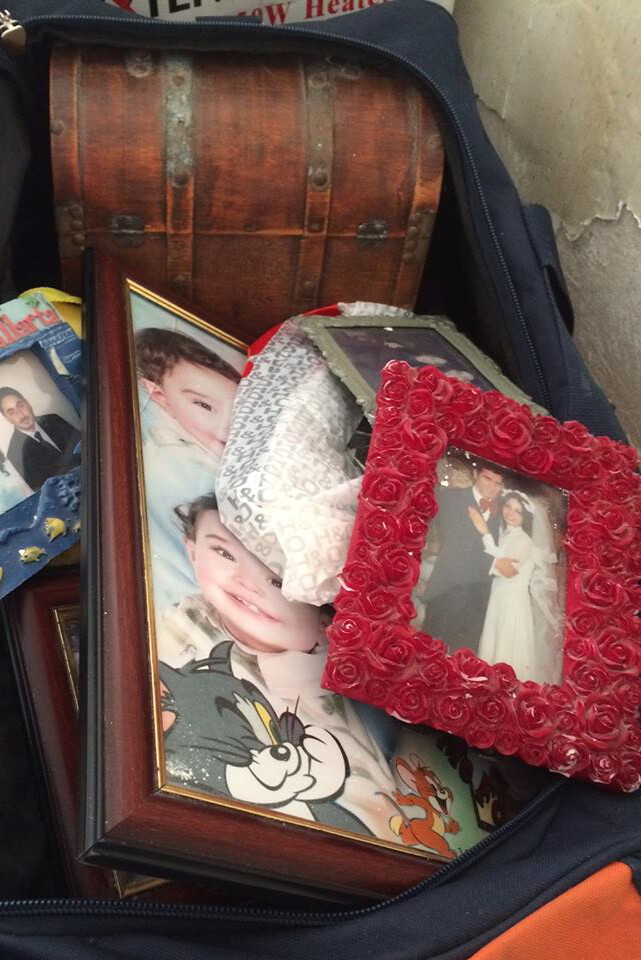
Personal mementos were packed in a bag by Nora as Israeli police gathered outside to evict the Sub Laban family from their home on 16 March.
In the late 1970s the two Palestinian families who used to live in the building alongside the Sub Labans were evicted to make way for Israeli settlers, and things began to get much more difficult.
Ahmad explained that in 1984, the settlers remodeled their residence, blocking off what had been a shared main entrance and leaving the Sub Labans with no way to access their property. “We had to go inside the settler house and jump from their kitchen window just to get to our own house,” with police escort, he said.
But very quickly the settlers blocked the family from entering at all. For the next sixteen years, both settler violence and court orders prevented the Sub Labans from accessing their home, compelling them to rent an apartment in the Beit Hanina neighborhood.
The family were finally allowed back into their Old City home in 2001 after an Israeli judge visited the property and ruled in the Sub Labans’ favor.
Relative peace
For the next decade there was a period of relative peace, Ahmad said.
That changed in 2010, when the Israeli Guardian of Absentee Property transferred ownership of the Sub Laban home to the settler group Ateret Cohanim. The group has publicly declared its aim of creating a Jewish majority in the Muslim Quarter of Jerusalem’s Old City and is one of several private settler organizations that the State of Israel collaborates with to Judaize Palestinian homes and neighborhoods, as the Israeli daily Haaretz has exposed.
According to Aviv Tatarsky, a researcher with the group Ir Amim, which works to promote equality in Jerusalem (Ahmad Sub Laban is a field researcher with the group), there are now approximately five hundred settlers affiliated with Ateret Cohanim living in the Muslim and Christian quarters of the Old City. All of them reside in properties from which Palestinian tenants like the Sub Laban family were evicted.
Five months after acquiring the family’s property, the settler group submitted a new suit against the Sub Labans that claimed they had deserted the house, and that the family had another property in the West Bank.
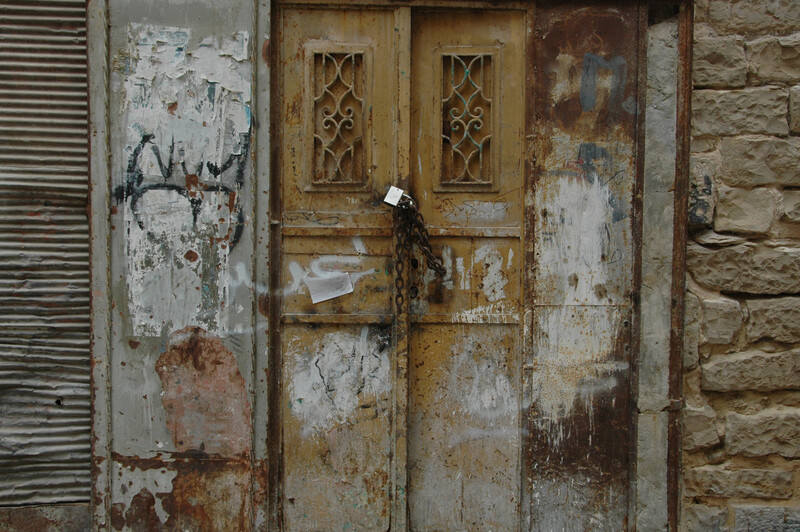
The locked main entrance to the Sub Laban family home, long blocked from use by Israeli settlers.
The settlers are also invoking the 1970 East Jerusalem Law that allows Israelis to reclaim property owned by Jews before the establishment of the state in 1948. The law permits heirs of the original owners to make a legal claim to take back the property and evict current residents if they can prove that the current residents have not lived there or paid rent consistently.
It is not lost on the Sub Laban family that Palestinians have been denied the right of return to and compensation for their property seized during the ethnic cleansing of Palestine at the time of Israel’s establishment in 1948.
“Palestinians have many lands in West Jerusalem and everywhere in Jerusalem that they no longer have access to,” Ahmad said. “There are many Palestinians who have the original ownership documents for their land which should allow them to get these lands back.”
Rigged system

Nora Sub Laban inside her Jerusalem home.
The Sub Laban case was hanging until September 2014 when an Israeli magistrate court ruled against the family, revoking their protected tenant status and declaring that they must leave the house and pay a fine.
Among the “evidence” the settlers used to show that the family weren’t actually living there was that they used very little electricity.
Ahmad told The Electronic Intifada that in 2010, when the family hooked up an air conditioner to the house, the Israeli authorities immediately issued an order to remove it.
“At the time we didn’t understand why they were doing this, and we thought that this was just another form of pressure against us to make us want to leave,” Ahmad said. “But now we know that this was part of [the settlers’] strategy: they didn’t want us to use a lot of electricity, because this would have provided a record to show that we had been living here.
“It’s a small house. There is not a lot of electric equipment,” he added. “Without the AC we use very little electricity.”
The Sub Laban family have little hope for justice in such a rigged system, and have started an online petition to raise international awareness of their case.
“We know it’s not a fair court or a fair trial,” Rafat said, referring about the family’s appeal hearing scheduled for the end of May. Rafat pointed out that Ram Winograd, the district court judge who rejected the injunction on the eviction order, is himself a settler.
“The simple fact is that our house in particular is being targeted because it is the last Palestinian household left in the building and the neighborhood. If we are evicted, Ateret Cohanim will have a huge property [in the Muslim quarter] that is only inhabited by Israeli settlers,” Rafat added.
Sarah Levy is an independent journalist living in the West Bank. Twitter: @levysarahm
